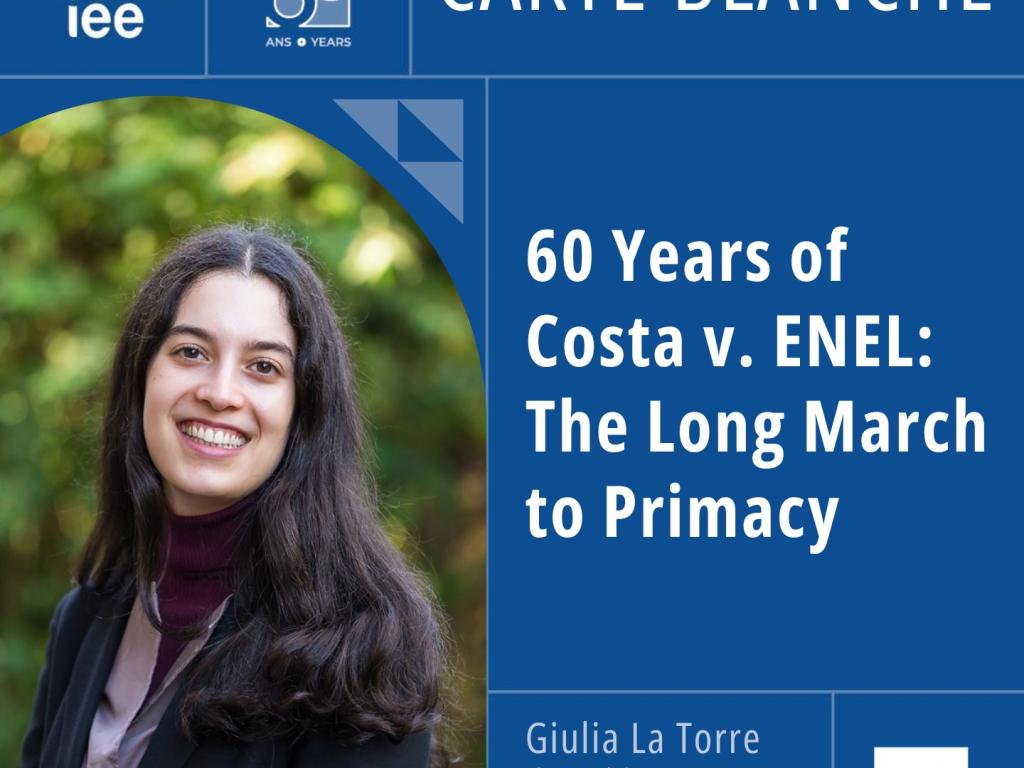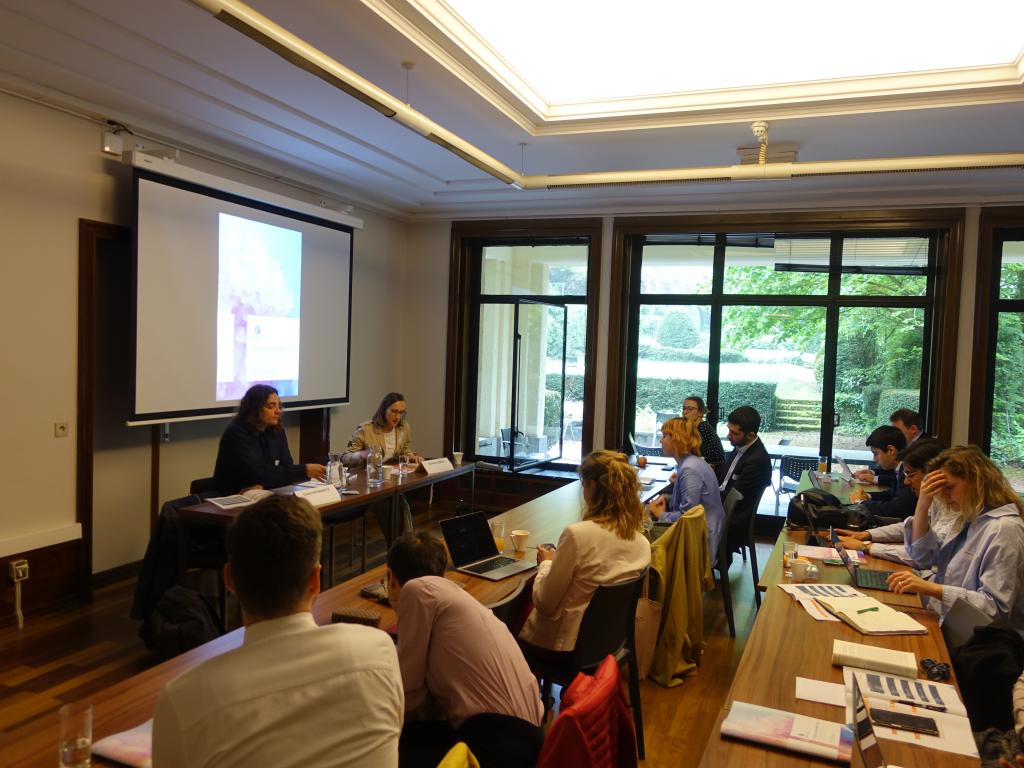Giulia La Torre
GEM-DIAMOND doctoral fellow
ESR 16 – The European Constitutional Counter-Revolution
Broadly interested in the interlinkages between the authority of law, constitutional discourse, and the legitimacy of adjudication, I am currently engaged in the study of the primacy of EU law. My research focuses, more specifically, on the theoretical foundations, normative underpinnings, and practical implications of the primacy principle.
Of authority and competing loyalties: Understanding the contested primacy of EU law
Essays on the intellectual contours, normative underpinnings, judicial conceptualization and justificatory function of the EU Law principle of primacy
Supervisors
- Nicolas Levrat
- Anne Weyembergh
Research abstract
The level of controversy surrounding the primacy principle is puzzling. As legal scholarship has been quick to point out, primacy is a far less radical notion than direct effect. The latter is grounded in the willingness to overcome the shortcomings of international law, foremost amongst which is enforcement. The former, in an effort not to break the ties that bind national legal systems together, brings EU law closer to the partial ways of international law. By virtue of the principle of primacy, EU law does not purport to upend the deeply-entrenched sets of legal traditions and practices that can be found at Member-State level. Nor, by the same token, do the EU Treaties aspire to stand as a proxy for the constitution and, thus, to offer an all-encompassing substitute source of political legitimacy. In much the same way as the principle of supremacy of international law, the principle of primacy of EU law reflects a rather more modest aspiration, namely the ascendancy of the provisions of EU law in the specific case. Seen in this light and against the broader swath of inter-state relations, the concept of primacy appears to be very much in line with the classical approach to the relation between international law and national law. Having regard to the unoriginal character of this primary element of EU law, the following questions arise: Why is the primacy of EU law still, to this day, such a hard pill to swallow for some Member State judiciaries? Why is the principle of primacy so often questioned (and sometimes challenged) by national judicial communities? In short, if primacy is simply a specification or a regional, more circumscribed version of a long-standing international law principle, why does it remain, at present, a subject of judicial disagreement in what would otherwise seem a well-established legal order?
The thesis seeks to answer these questions. More specifically, the aim is to puzzle out the meaning and significance of the doctrine of primacy in its triple role as ordering principle, interpretive rule, and conflict maxim, thereby furthering the current understanding of the character, force, and scope of EU law. The principle of primacy is, thus, used as a vehicle for exploring a larger three-dimensional theme, namely the establishment, justification, and consolidation of the binding power of EU law. Accordingly, the thesis should be thought of as a multi-step intellectual effort, which, having at its centre the principle of primacy, begins with an interpretive account of the historical development of the EU legal system, moves on to an analysis of the practice of norm-justification of the CJEU, and ends with a critical discussion of inter-jurisdictional conflict in the EU – all in a bid to make sense of the claim, the basis, and the boundaries of the authority of EU law.
Personal Research Bibliography (So Far)
ALEXY, R., A Theory of Constitutional Rights, Oxford University Press, 2010
AZOULAI, L., The Question of Competence in the European Union, Oxford University Press, 2014
BAQUERO CRUZ, J., What’s left of the Law of Integration: Decay and Resistance in European Union Law, Oxford University Press, 2018
BEAUD, O., Théorie de la Fédération, Presses Universitaires de France, 2007
BENGOETXEA, J., The Legal Reasoning of the European Court of Justice, Clarendon Press, 1993
CONWAY, G., The Limits of Legal Reasoning and the European Court of Justice, Cambridge University Press, 2012
DAVIES, G. & AVBELJ, M., Research Handbook on Legal Pluralism and EU Law, Edward Elgar Publishing, 2018
DWORKIN, R., Law's Empire, Hart Publishing, 1998
HABERMAS, J., Between Facts and Norms, MIT Press, 1996 HART, H. L. A., The Concept of Law, Oxford University Press, 1988
HIRSCHL, R., Towards Juristocracy: Origins and Consequences of the New Constitutionalism, Harvard University Press, 2007
ISIKSEL, T., Europe’s Functional Constitution, Oxford University Press, 2016 JACQUÉ, J., Droit institutionnel de l’Union européenne, Dalloz, 2018
JOERGES, C. & SINGH, N., The Darker Legacies of Law in Europe: The Shadow of National Socialism and Fascism Over Europe and Its Legal Traditions, Hart Publishing, 2003
KAHN, P., Origins of Order: Project and System in the American Legal Imagination, Yale University Press, 2019
KELSEN, H., Pure Theory of Law, University of California Press, 1967
LARSEN, S., The Constitutional Theory of the Federation and the European Union, Oxford University Press, 2021
LENAERTS, K. & GUTIÉRREZ-FONS, A., Les méthodes d’interprétation de la Cour de justice de l’Union européenne, Bruylant, 2020
SCHÜTZE, R., From Dual to Cooperative Federalism: The Changing Structure of European Law, Oxford University Press, 2009
SOMEK, A., The Cosmopolitan Constitution, Oxford University Press, 2014
TAMANAHA, B., Law as a Means to an End: Threat to the Rule of Law, Cambridge University Press, 2006
TRIDIMAS, T., The General Principles of EC Law, Oxford University Press, 2006
TUORI, K., European Constitutionalism, Cambridge University Press, 2015
VON BOGDANDY, A. & BAST, J., Principles of European Constitutional Law, Hart Publishing, 2006
WEILER, J., The Constitution of Europe, Cambridge University Press, 1999
Articles & Book Chapters
AVBELJ, M., Supremacy or Primacy of EU Law – (Why) Does it Matter?, European Law Journal, Vol. 17, No. 6, November 2011, pp. 744-763
BAQUERO CRUZ, J., The Legacy of the Maastricht-Urteil and the Pluralist Movement, European Law Journal, Vol. 14, No. 4, 2008, pp. 389-422
DAVIES G., Democracy and Legitimacy in the Shadow of Purposive Competence, European Law Journal, Vol. 21, No. 1, January 2015, pp. 2-22
DE WITTE, B., Direct Effect, Supremacy and the Nature of the Legal Order in The Evolution of the EU Law, Oxford University Press, 1999, pp. 177-213
GRIMM, D., The Democratic Costs of Constitutionalisation: The European Case, European Law Journal, Vol. 21, No. 4, July 2015, pp. 460-473
LENAERTS, K. & GUTIÉRREZ-FONS, A., The Constitutional Allocation of Powers and General Principles of EU Law, Common Market Law Review, Vol. 47, No. 1, 2010, pp. 1629-1669
SABEL, C. F. & GERSTENBERG, O., Constitutionalising an Overlapping Consensus: The ECJ and the Emergence of a Coordinate Constitutional Order, European Law Journal, Vol. 16, No. 5, 2010, pp. 511-550
STONE SWEET, A. & MATHEWS, J., Proportionality Balancing and Global Constitutionalism, Columbia Journal of Transnational Law, Vol. 47, No. 1, Fall 2008, pp. 72-164
TEUBNER, G., Substantive and Reflexive Elements in Modern Law, Law & Society Review, Vol. 17, No. 2, 1983, pp. 239-286
WEILER, J., Europe in Crisis-on “Political Messianism”, “Legitimacy” and the “Rule of Law”, Singapore Journal of Legal Studies, 2012, pp. 248-268
Personal Methods-Specific Bibliography (So Far)
BALLIN, E.H., Advanced Introduction to Legal Research Methods, Edward Elgar Publishing, 2020 ECO, U., Come si fa una tesi di laurea, Bompiani, 1977
EPSTEIN, L. & MARTIN, A.D., An Introduction to Empirical Legal Research, Oxford University Press, 2014
MONATERI, P.G., Methods of Comparative Law, Edward Elgar Publishing, 2013
SALTER, M. & MASON, J., Writing Law Dissertations: An Introduction and Guide to the Conduct of Legal Research, Pearson Longman, 2007
SAMUEL, G., An Introduction to Comparative Law Theory and Method, Hart Publishing, 2014
VAN HOECKE, M., Methodologies of Legal Research: Which Kind of Method for What Kind of Discipline?, Hart Publishing, 2011
Articles & Book Chapters
BALDWIN, J. & DAVIS, G., Empirical Research in Law in The Oxford Handbook of Legal Studies, Oxford University Press, 2005, pp. 880-900
CRYER, R., HERVEY, T., SOKHI-BULLEY, B., & BOHM, A., Thinking about Research and Scholarship in EU and International Law in Research Methodologies in EU and International Law, Hart Publishing, 2011, pp. 16-33
HIRSCHL, R., The Question of Case Selection in Comparative Constitutional Law, The American Journal of Comparative Law, Vol. 53, No. 1, 2005, pp. 125-155
LENAERTS K., Interlocking Legal Orders in the European Union and Comparative Law, International and Comparative Law Quarterly, Vol. 52, No. 4, 2003, pp. 873-906
TYLER, T.R., Methodology in Legal Research, Utrecht Law Review, Vol. 13, No. 3, 2017, pp. 130-141
La Torre, G., 'Scholar Activism' in: Coman, R., Paternotte, D. & Ponjaert, F. (eds), Impact and Social Sciences: A Conceptual Index (forthcoming)
La Torre, G., ‘We can Best Uphold Democracy and Defend the Rule of Law by Listening to Citizens’. Interview with Judge Javier Hernández García in: Coman, R., Kazai, V., Puleo, L. & Bradley, A. (eds), Dissensus over Liberal Democracy: Insights from European Judges, Hart Publishing, 2025.
La Torre, G., '60 Years of Costa v. Enel: The Long March to Primacy' in: Brière, C. & Foret, F. (eds), L’IEE a 60 ans! Penser l’Europe (1964-2024): changements et continuités, Éditions de l'Université de Bruxelles, 2024. Accessible here: https://www.iee-ulb.eu/content/uploads/2024/03/Carte-blanche_Giulia-La-Torre_1103.pdf
Selected Paper Presentations in Conferences and Workshops
'Judicial Disagreement over the Primacy of EU Law' (as part of the panel 'Theoretical Perspectives on European Constitutionalism'), ELU-S Inaugural Conference, Charles University, Prague, September 25-27, 2025
'A Tale of Two Primacies: The Rule of Which Law?' (as part of the panel 'EU Constitutional Values'), Public Law in an Age of Contestation and Systemic Change, ICON-S Benelux Second Chapter Conference, Brussels, May 22-23, 2025
'The Principle of Primacy and Judicial Dissensus', 3rd GEM-DIAMOND Annual Conference, Université Paris 1 Panthéon-Sorbonne, Paris, February 24-26, 2025
'The Rule of Law in the EU: The Presumption of Legality', Workshop on International Organizations and the Rule of Law, Université de Genève, Geneva, January 22-23, 2025
PhD Thesis Empirics, 2nd GEM-DIAMOND Annual Conference, LUISS, Rome, March 12-14, 2024
‘The Long Arc of EU Law: Evolution or Revolution?’, 70 Years of EU Law: Continuity and Discontinuity, Max-Planck Institute for Comparative Public Law and International Law, Heidelberg, February 1-3, 2024
'Understanding the Contested Primacy of EU Law' (as part of the panel 'Internal Contestation and its Impact on the EU in Times of Dissensus'), European Union in International Affairs (EUIA) Annual Conference, Royal Belgian Academy, Brussels, May 3-5, 2023
PhD Thesis Design, 1st GEM-DIAMOND Annual Conference, IEE-ULB, Brussels, March 13-15, 2023
Training
12th Max-Planck MasterClass in International Law, Max-Planck Institute for Comparative Public Law and International Law, Heidelberg, June 10-13, 2025
GEM-DIAMOND Autumn School, IEE-ULB, Brussels, October 28-29, 2024
GEM-DIAMOND Summer School, IEE-ULB, Brussels, June 24-25, 2024
Qualitative Methods Workshop, University of Amsterdam, Amsterdam, June 19-21, 2023
Interdisciplinary Qualitative Research Workshop, iCourts, University of Copenhagen, Copenhagen, 19-21 April, 2023
-

The Long March to Primacy
12 March 2024
An op-ed published by Giulia La Torre for the 60th anniversary of the IEE-ULB
-

‘Law without Force’ Revisited: Niemeyer’s Vision of International Law
21 November 2023
A glimpse into Gerhart Niemeyer's functional conception of law through 21st-century European eyes
-

The 2nd GEM-DIAMOND’s Citizen Innovation Lab on Impact and Social Science
19 June 2023
Research impact and its relation to science and society: a tale from the crossroads
-

Birth of the GEM-DIAMOND Fellowship of the Ph.D.
1 October 2022
16 MSCA Fellows successfully selected following a gruelling selection process.



